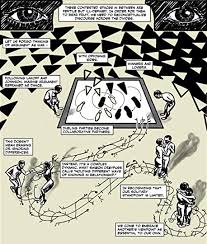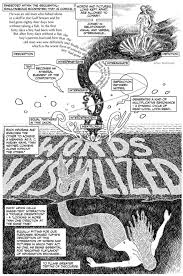My first book of 2022 was in the category graphic novel. But the book in question is not a novel. It is a philosophy book that is written with words and drawings.
But graphic novel is the category according to Wikipedia, so I will go with it:
A graphic novel is a book made up of comics content. Although the word "novel" normally refers to long fictional works, the term "graphic novel" is applied broadly and includes fiction, non-fiction, and anthologized work. It is, at least in the United States, typically distinct from the term "comic book", which is generally used for comics periodicals and trade paperbacks.
Before I read Unflattening, I heard Nick Sousanis talk about how his book came to be and what he was trying to do with his use of graphics. I loved hearing him talk about how our eyes follow images and graphical cues and how he used that knowledge to create the book.
I liked this review by comicsgrid.com
Over eight chapters, Unflattening follows an anonymous, sleepwalking figure as they step out of a regimented life and take flight to explore new worlds. Sousanis draws the imagery of these worlds from TV, movies, the classical canon of art, and scientific diagrams. Unflattening embraces visual references from Paleolithic cave prints to James Bond films, and verbal ones from Bruno Latour to Wallace Stevens. The protagonist bears at one time Hermes’ sandals and at others wings of its own; it is incarnated as a Pinocchio-like puppet confounded by a centipede’s existential challenge, ‘Who are you?’, before finally being reborn as a child reminiscent of Kubrick’s 2001: A Space Odyssey (1968). The comic’s final image is of that newborn’s eye opening to see the world as if for the first time.
In the course of this journey, Sousanis dethrones the primacy of the word in a kind of Copernican revolution. He argues that image is not mere illustration, subordinate to words, but an equal partner and component in thinking. He explores stereoscopic vision and the principles of astronomical observation as metaphors in order to define ‘unflattening’ as ‘a simultaneous engagement of multiple vantage points from which to engender new ways of seeing.’ (Sousanis 2015: 32).
An extended sequence takes us through the world of Edwin Abbott’s Flatland, in which two-dimensional ‘A. Square’ encounters a three-dimensional sphere who exposes him to previously unimagined perspectives. We need each other’s points of view, Sousanis tells us, to avoid become constrained in set modes of thinking and blinkered perspectives, just as A. Square must be enlightened by his encounter with the sphere. Words and images together free us from the limitations presented by either the purely visual or purely verbal.
And here are a few pages.
I hesitated to read the book for a long time, but now I am reading two other graphic novels (both biographies of scientists). Unflattening will take your mind places it has never been before.
Enjoy!
My books of 2021:












